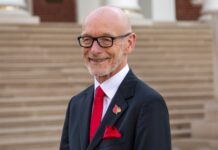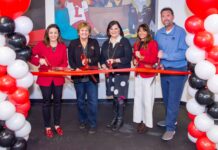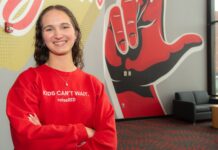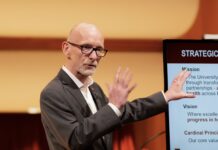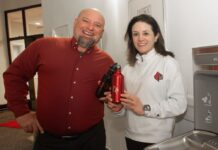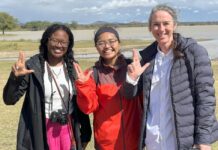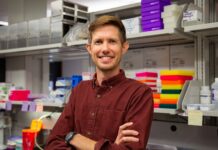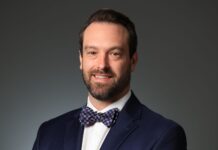It’s no secret that the University of Louisville’s mission extends well beyond educating college students to include providing engaged service and outreach to the community at large. A perhaps lesser-known aspect of that outreach includes making education accessible through public events where science-based research is offered up with food, drinks or entertainment on the side.
UofL makes education more palatable for the public by providing unique opportunities to engage with scientists through events like Astronomy on Tap and Beer with a Scientist, with visits to the Owsley Brown II Portable Planetarium, or by sharing neurological research during Brain Days.
“Community engagement does take different forms,” said Henry Cunningham, director of community engagement at UofL. “A major aspect of this work is using the knowledge and expertise of faculty and students to inform the community on various topics. This is seen with “Beer with a Scientist”, where researchers share their research in a bar setting in lay language that everyone can understand.”
“A lot of people don’t have access to scientists,” said Levi Beverly, assistant professor of medicine and creator of the Beer with a Scientist series. “I think we take it for granted working on a college campus.”
Lessons and lagers
Beer with a Scientist and Astronomy on Tap are two similar lecture series from very different beginnings. Beer with a Scientist began four years ago after Beverly, a New York City native, moved to Louisville and wanted to start an underground science program that was similar to those in his hometown.
The event offers just what the name entails: beer at Against the Grain Brewery and a chance for the general public to become informed on a different science topic each month. Lectures are typically given by UofL faculty on topics ranging from biomedical sciences to artificial intelligence.
“One of my passions is disseminating information to the public,” said Beverly. “I wanted science to be accessible to the public in an informal venue.”
Beverly started Louisville Underground Science, a group of people passionate about sharing all things science, as a sponsoring body for the public lecture series. “Originally it was just me trying to start a talk,” he said. “I didn’t want to have to use university resources.”
Astronomy on Tap, an event series that originated in New York City in 2014, was brought to Louisville the following year by Gerard Williger, a physics and astronomy associate professor. When Williger arrived at UofL in 2005, he was one of only a few astronomers at the university and wanted to use Astronomy on Tap as a way to increase awareness of the astronomy program. “I had a desire to build up our program through public outreach,” he said.
Astronomy on Tap is held once a month at Monnik Beer Company where participants can enjoy local brews while learning about topics ranging from interstellar dust’s role in the galaxy to the science behind multiverses.
Brain building
Brain Days is the brainchild of Kristopher Rau, senior research associate in UofL’s Department of Anesthesiology and past president of the Louisville Chapter of the Society for Neuroscience. The annual, two-day event was started in 2017 and is held at the Kentucky Science Center. It features hands-on activities designed to educate families about neuroscience.
“I’ve had a passion for community service and science and I wanted to combine my passions through this program,” said Rau. “We try to develop a variety of different stations that can reach several target audiences.”
The 2018 event featured 88 volunteers and 24 stations on all three floors of the science center. Activities included: Building a neuron using pipe cleaners, Styrofoam balls, and beads; constructing a cardboard brain hat; and putting together a giant spine puzzle.
Collectively, the Brain Days scientists and clinicians logged more than 415 volunteer hours to expose over 1,700 visitors to neuroscience.
“I feel that instilling a culture of science outreach is so important at UofL,” said Rau. “From my perspective, our outreach program benefits everyone who is involved. It benefits the public by advancing science literacy. It gets kids of all backgrounds excited about neuroscience and it breaks down that ‘ivory tower’ and helps the public see us for who we are — a group who, while not always perfect, are regular people trying to do our jobs to advance medicine and improve everyone’s health.”
Out-of-this-world education
UofL’s Owsley Brown ll Portable Planetarium was originally created to alleviate some of the logistical hassles and financial constraints of student field trips. With the help of an advisory board and donors, the portable planetarium was funded in 2012.
The programming for the portable planetarium is connected to K–12 science content standards that were developed by states to improve science education for students, but is also customizable depending on the location of the portable planetarium and the curriculum instructors want taught. The portable planetarium regularly visits elementary, middle and high schools, and occasionally makes appearances at community festivals and events.
“The value the portable planetarium offers to the community is evidenced by the increased number of bookings from year to year,” said Thomas Tretter, director of the Gheens Science Hall & Rauch Planetarium.
“Educators appreciate how easily their students grasp complex, difficult concepts in this unique, visually-rich environment.”
The portable planetarium features an inflatable domed ceiling with a projection system that provides participants virtually the same experience they’d have at the planetarium located on the university’s Belknap Campus.
“Viewing the portable planetarium brought the universe to life for our students at Valley High,” said Alicia Gruenwald, biology and chemistry teacher at Valley High School. “Surrounded by the stars, students envisioned the cosmos through new eyes. This experience led students to deeper understanding and new questions.”
Psyched about research
Psych 410, a Psychology Department course also known as “giving psychology away at the University of Louisville” allows students majoring in psychology to share what they have learned with children in the community.
Students in the class design and share with schoolchildren demonstrations of psychological findings for an event called “Get Psyched.” The first event was held on UofL’s campus in 2016 but has since moved off campus to local schools including Shelby Traditional Academy, a public elementary school close to campus. Over the years, “Get Psyched” activities have covered topics such as spatial navigation, taste perception, delayed auditory feedback, and conformity.
“I think it’s a win-win,” said Judith Danovitch, associate professor in UofL’s Department of Psychological and Brain Sciences and instructor of the course. “It gives students an opportunity to show off what they’ve learned and it gives kids in the community a chance to learn about psychology in a way they might not normally experience.”
The last “Get Psyched” event had upwards of 50 attendees from more than 20 different zip codes. Children and parents participated in eight different student-led demonstrations and a research study, and they had the chance to learn how psychology impacts their daily lives.







